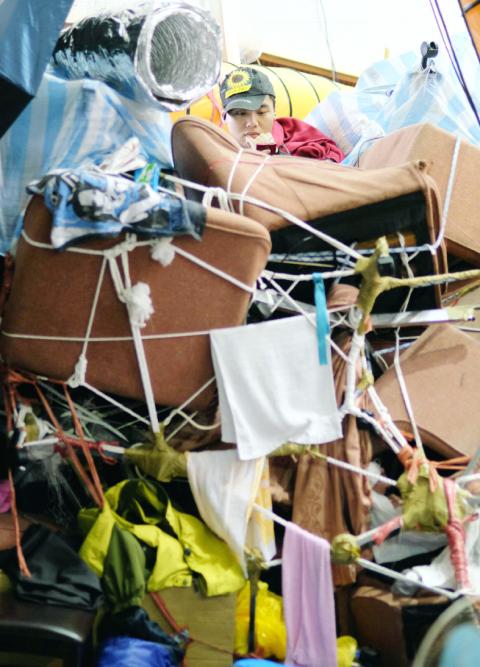The Ministry of the Interior said yesterday that any attempt to ask for donations for the Sunflower movement against the cross-strait service trade agreement would constitute a violation of the Political Donation Act (政治獻金法), which is punishable by a fine of twice the amount of money raised and the confiscation of all donations.
The ministry made the remarks one day after a Facebook page, titled “Repairing 318 Legislative Yuan,” was set up by netizens supportive of the Sunflower movement to solicit money for repairs to the damage inflicted to the legislative chamber during the protesters’ 24-day occupation.
The netizens planned to use the money to cover the rental fees for audio equipment installed inside and outside the legislature during the protest, which is scheduled to come to an end today.

Photo: Sam Yeh, AFP
Legislative Yuan staffers say the occupation has caused damage to chairs, doors, carpets, microphones, the broadcasting system and some valuable paintings.
“As the student movement is categorized as a political activity, any money donated to or raised for it will be deemed a political donation,” the ministry said, adding that only political parties, political associations and election candidates are allowed to accept political donations.
The ministry said student organizations that have claimed that their fund-raising attempts are for charitable purposes would have the legitimacy of their actions determined by the Control Yuan or the Ministry of Health and Welfare.
The ministry’s statement drew immediate criticism from netizens, some citing the more than NT$100 million (US$3.3 million) raised in 2006 by civic groups supporting a movement against then-president Chen Shui-bian (陳水扁) and accused the ministry of double standards.
“I wonder if anyone who solicited money for the movement at that time was ever fined,” a netizen wrote.
Separately yesterday, Legislative Yuan Speaker Wang Jin-pyng (王金平) said that as many “kind-hearted people” have expressed an intention to pay for the repairs, not a penny of taxpayers’ money would be used to cover the costs of the restoration work on the legislature.
Tsai Wei-min (蔡衛民) of the Legislative Yuan’s General Affairs Department on Tuesday turned down the offer by netizens to help to pay for the repairs.
Meanwhile, Executive Yuan spokesperson Sun Lih-chyun (孫立群) said yesterday that the Cabinet plans to seek NT$3 million compensation from the protesters who broke into and briefly took over the Executive Yuan compound on March 23.
Sun said the protesters destroyed four timber doors, 13 windows, a refrigerator, a photocopy machine, a fax machine, a cabinet, and several tables and chairs, which combined were worth NT$3 million.
“All the parties involved in the brief occupation have given their statements to police and have been summoned by prosecutors for questioning. We will file a civil lawsuit against them once prosecutors conclude their investigation,” Sun said.
Sun said that the Executive Yuan “is not currently considering” dropping the case against the protesters and “has not thought about” the possibility of accepting donations from businesses rather than asking the protesters to pay for the damage.
Additional reporting by CNA

PREPAREDNESS: Given the difficulty of importing ammunition during wartime, the Ministry of National Defense said it would prioritize ‘coproduction’ partnerships A newly formed unit of the Marine Corps tasked with land-based security operations has recently replaced its aging, domestically produced rifles with more advanced, US-made M4A1 rifles, a source said yesterday. The unnamed source familiar with the matter said the First Security Battalion of the Marine Corps’ Air Defense and Base Guard Group has replaced its older T65K2 rifles, which have been in service since the late 1980s, with the newly received M4A1s. The source did not say exactly when the upgrade took place or how many M4A1s were issued to the battalion. The confirmation came after Chinese-language media reported

A Ministry of Foreign Affairs official yesterday said that a delegation that visited China for an APEC meeting did not receive any kind of treatment that downgraded Taiwan’s sovereignty. Department of International Organizations Director-General Jonathan Sun (孫儉元) said that he and a group of ministry officials visited Shenzhen, China, to attend the APEC Informal Senior Officials’ Meeting last month. The trip went “smoothly and safely” for all Taiwanese delegates, as the Chinese side arranged the trip in accordance with long-standing practices, Sun said at the ministry’s weekly briefing. The Taiwanese group did not encounter any political suppression, he said. Sun made the remarks when

The Taiwanese passport ranked 33rd in a global listing of passports by convenience this month, rising three places from last month’s ranking, but matching its position in January last year. The Henley Passport Index, an international ranking of passports by the number of designations its holder can travel to without a visa, showed that the Taiwan passport enables holders to travel to 139 countries and territories without a visa. Singapore’s passport was ranked the most powerful with visa-free access to 192 destinations out of 227, according to the index published on Tuesday by UK-based migration investment consultancy firm Henley and Partners. Japan’s and

BROAD AGREEMENT: The two are nearing a trade deal to reduce Taiwan’s tariff to 15% and a commitment for TSMC to build five more fabs, a ‘New York Times’ report said Taiwan and the US have reached a broad consensus on a trade deal, the Executive Yuan’s Office of Trade Negotiations said yesterday, after a report said that Washington is set to reduce Taiwan’s tariff rate to 15 percent. The New York Times on Monday reported that the two nations are nearing a trade deal to reduce Taiwan’s tariff rate to 15 percent and commit Taiwan Semiconductor Manufacturing Co (TSMC, 台積電) to building at least five more facilities in the US. “The agreement, which has been under negotiation for months, is being legally scrubbed and could be announced this month,” the paper said,